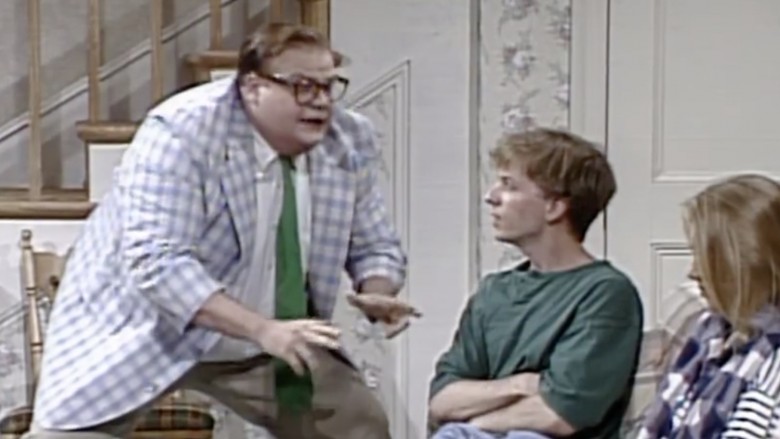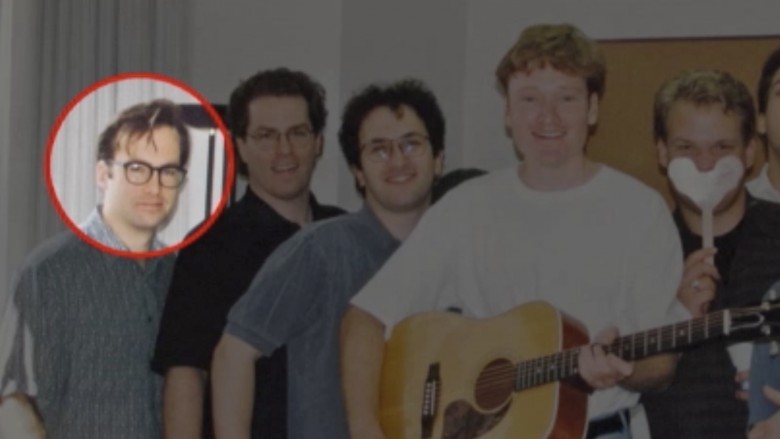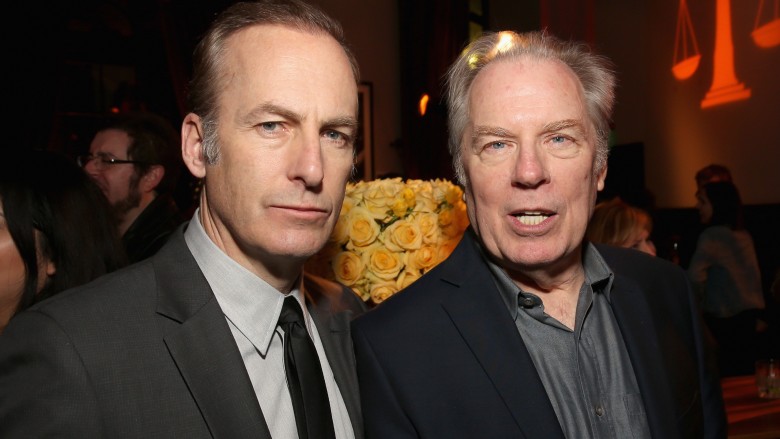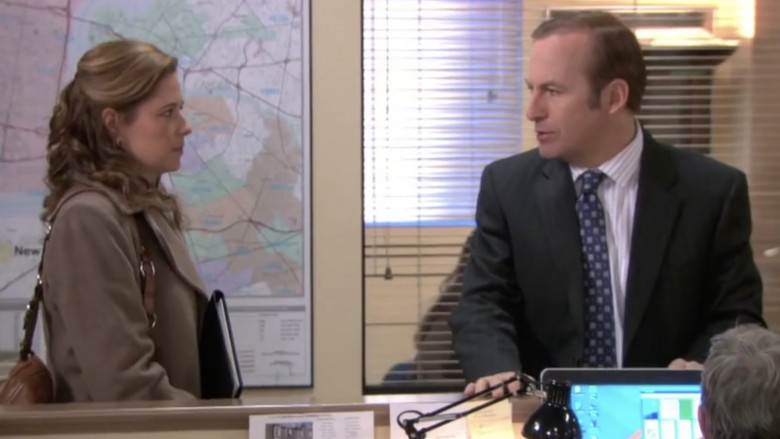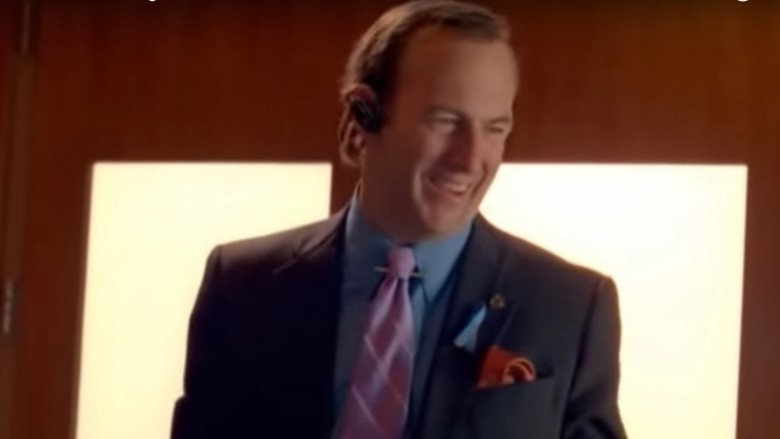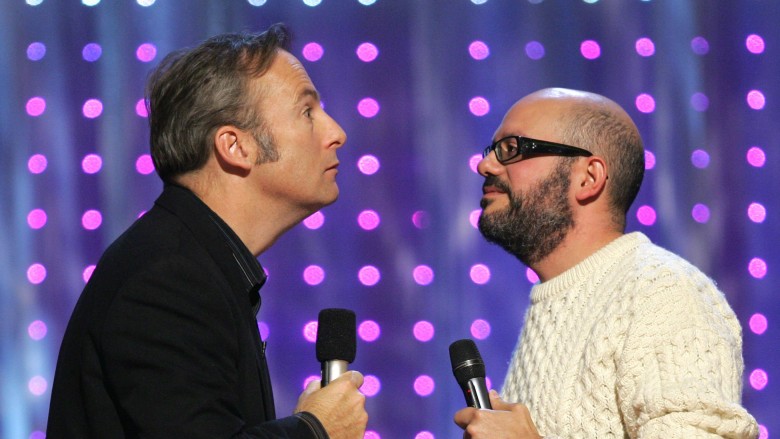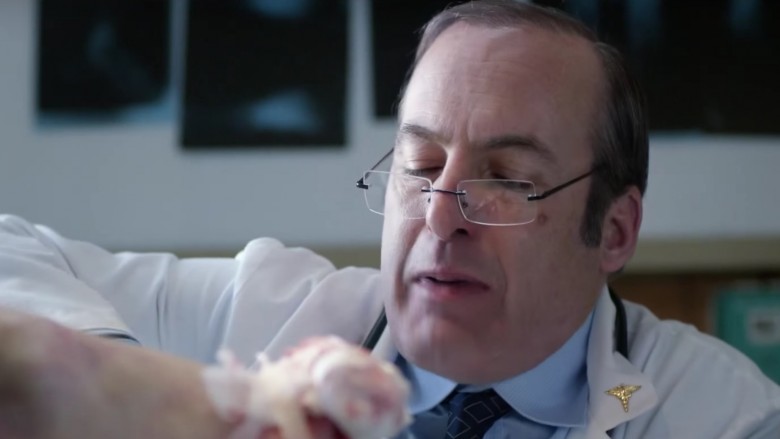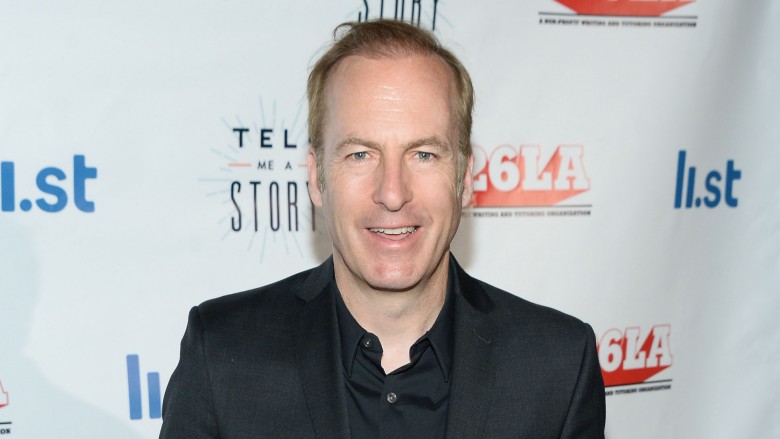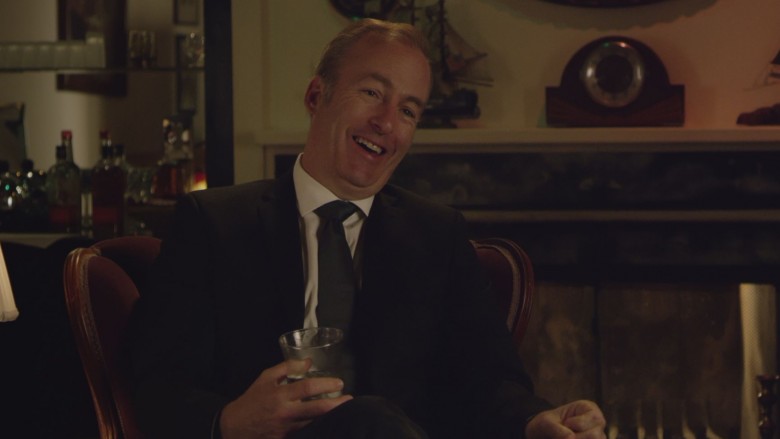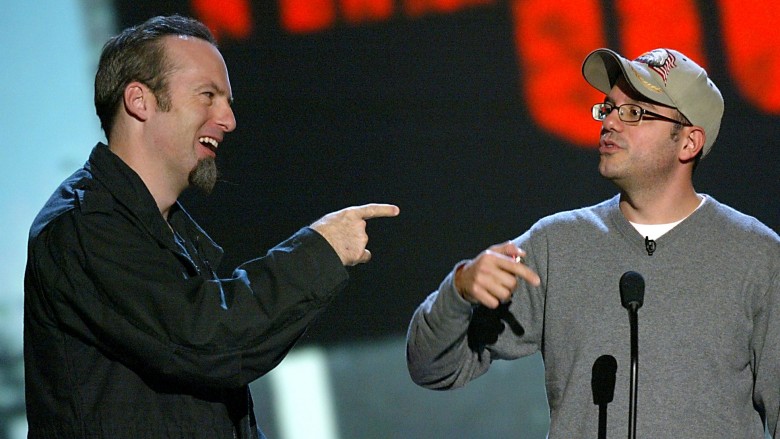The Untold Truth Of Bob Odenkirk
We may receive a commission on purchases made from links.
With the exception of Howie Mandel and those "wasssssssup" guys, nobody has shaped modern-day comedy to the degree that Bob Odenkirk has. Today he's best known as an actor, portraying Saul Goodman on both Breaking Bad and its spinoff, Better Call Saul. But Odenkirk's career has spanned nearly 30 years — he wrote for SNL in the '80s, co-created and starred on HBO's incredibly influential Mr. Show with Bob and David, and helped launch the careers of comedy stars of the big screen, little screen, and Internet. (And he directed Let's Go to Prison!)
Here are some things you may not have known about the Bob in "Bob and David." Terra-da-loo!
He helped create the Matt Foley "van down by the river" character
Odenkirk was a writer for SNL on three different occasions: from 1987 to 1991 (when the show was good), briefly in 1993 (when the show was less good), and then once more from 1994 to 1995 (when the show was so not-good, it was proclaimed "a grim joke" by New York). Odenkirk actually created one of the most famous and beloved SNL recurring characters during that first period, but he did it far, far away from the SNL writers' room.
In summer 1990, the show was on its summer break, and Odenkirk returned to Chicago to work at the famed Second City comedy theater. It was there that he met Chris Farley, a young comic who was set to join SNL that coming fall. Together, they created the character of Matt Foley, the "motivational speaker" who "lives in a van down by the river." Odenkirk and Farley took Foley back to SNL, to the delight of millions, because there's truly nothing in this world funnier than Chris Farley yelling at David Spade and then falling through a table.
Him and Conan go way back
Odenkirk and Conan O'Brien were both on the writing staff of SNL at the same time in the late '80s. In the summer of 1988, during the show's annual hiatus, the duo moved to Chicago together ... to perform! They put together a live comedy act called Happy Happy Good Show, where they were free to not just write but to be actors. The latter is something they didn't get to do much of at SNL, apart from the occasional, silent role as a waiter in a restaurant sketch.
Among the bits created for the show were some that O'Brien and Odenkirk would later revive and expand, including the SNL recurring sketch "Bill Swerski's Super Fans" ("Da Bears!) and "The Year 2000," an early standout on Late Night with Conan O'Brien. That segment got a lot of play, likely because Odenkirk was part of the very first staff of Late Night when it debuted in 1993. He probably also suggested to keep the sketch going even after the year 2000, because that's just how comic geniuses think.
He's got a long history with Michael McKean
Odenkirk's sensibility has influenced so much comedy and entertainment, he's like a modern-day Michael McKean. And since Hollywood is such a small and incestuous place, Odenkirk and McKean just keep crossing paths.
Currently, they costar on Better Call Saul as, respectively, small-time lawyer Jimmy McGill and his probably evil brother, established Albuquerque law firm partner Chuck McGill. These two comedy legends inexplicably starring in a legal drama isn't the first time that McKean and Odenkirk have worked together, as McKean also guest-starred on a fourth-season episode of Odenkirk's Mr. Show. Before that, they briefly worked on SNL together, during the 1994-95 season: Odenkirk was a writer, and McKean was brought on as a cast member (as part of an ill-fated experiment to stock the show with well-known performers, instead of up-and-comers).
Beyond all that, McKean was a big influence on Odenkirk's sensibilities. When he was a kid, Odenkirk says that he loved listening to a handful of comedy albums over and over, particularly Steve Martin's Let's Get Small and the Credibility Gap's 1979 release, Floats. Guess who was in the Credibility Gap? Michael McKean. So maybe it's not Hollywood that's small and incestuous, but rather Earth.
He almost starred on The Office
In 2004, NBC licensed Ricky Gervais's dry, dark British comedy The Office to make an American version. Their first choice to play the awkward, overbearing, and rude boss Michael Scott was Paul Giamatti. He said no, so other middle-aged white guys who could do comedy and were available were sought out, among them Bob Odenkirk. He actually got as far as the audition phase, but producers ultimately went with Steve Carell, who did a pretty good job with the role, if six Emmy nominations for "Outstanding Lead Actor in a Comedy Series" is considered "good."
He may have gotten skipped over, but Odenkirk would eventually show up in the final season of The Office playing, more or less, Michael Scott. In the episode, Pam goes for a job interview at an office run by a guy who acts an awful lot like Michael Scott. Met the new boss, same as the old boss.
He didn't watch Breaking Bad before joining "Saul"
Odenkirk told the Hollywood Reporter that he doesn't really like watching stuff that he appears in. It's not due to awkwardness with seeing himself on screen, or a displeasure with how things turned out. Rather, it's to be a better actor—Odenkirk says that not watching his own stuff helps him stay present in the scene when he's filming. "I really don't want to know what's coming later and I don't look back at what came before," he said. "I think it's a perfectly good way to approach acting to not know what the f*** is going on."
Case in point: when he took on the role of Saul Goodman, he'd seen an estimated 10 minutes of the show's first two seasons, something made very clear when Bryan Cranston called him out on it. While filming a scene, Odenkirk had a line in which he spoke in a friendly matter about a character that Saul actually despised. "That guy's not your friend, don't say it like that," Odenkirk says Cranston told him. Then, Cranston paused and asked Odenkirk, "You don't watch the show, do you?" Busted!
Odenkirk has since broken his rule and watched the show — luckily for him, Breaking Bad is awesome.
How Bob met David
They're the "Bob and David" in Mr. Show with Bob and David, but when they first met—and for quite a while after that—Bob Odenkirk and his long-time comedy companion/collaborator, David Cross, did not get along.
In the early '90s, Janeane Garofalo was hanging out in Los Angeles with her friend, Cross, who was in for a visit from Boston. He had a hit sketch show in a club back home, but since that doesn't make anybody any money, he was checking out L.A. Bored one day, he asked Garofalo if she could knew any dudes who might want to play some basketball. Yes, she said: Bob Odenkirk, who at the time was writing for Chris Elliott's sitcom Get a Life. He wasn't interested in shooting hoops, however, as Garofalo stated he dismissed them from his home in a "socially brusque manner." That's Hollywood talk for "such a jerk."
About a year later, Garofalo and Odenkirk were cast on The Ben Stiller Show. Cross was still under-employed, and Garofalo recommended he apply to write on the show. He got the job toward the end of the series' first, and only, season. However, he and Odenkirk still didn't get along—David was young and happy to be there, while Odenkirk admits he was outright rude to Cross, just for the sake of being rude.
After Stiller ended in early 1993, Odenkirk and Cross found themselves thrust together a lot, part of the same small circle of L.A. alt-comedy people. Odenkirk was dating Garofalo, for example, and wound up hanging out in the kitchen at a party one night, making dumb jokes about the pots and pans. Finally, they started laughing, and after working together at the Just for Laughs comedy festival in Montreal (Cross said on a Mr. Show DVD commentary that he had been hired "to write crap for idiots" and Odenkirk tagged along) they became thick as thieves. By 1995, they were starring on Mr. Show together, and they've been comedy-married ever since.
He discovered Tim and Eric
The confrontational, weird, Andy Kaufman-esque comedy of Tim and Eric, through series like Tom Goes to the Mayor, Tim and Eric Awesome Show, Great Job! and Tim and Eric's Bedtime Stories, has inspired countless others to make their own unsettling, gross-out comedy. None of it would have happened without a boost back in the day from Odenkirk.
In 2002, Tim Heidecker sent some unsolicited DVDs of some work he'd done with Eric Wareheim to a number of comedy luminaries, seeking their assistance in reaching a wider audience. Of the people they sent it to—Conan O'Brien, Robert Smigel, and Bob Odenkirk—only Odenkirk responded. They sent it to him because they thought Odenkirk had a similar sensibility, with Heidecker saying that Mr. Show "seemed aimed directly at us, almost as if Bob and David had infiltrated our brains." Odenkirk provided sage advice on both humor and show business, which helped Tim and Eric develop and expand what was on that DVD: an early version of Tom Goes to the Mayor, which debuted on Adult Swim in 2004.
He doesn't drink
In a Reddit AMA in 2014, a fan asked Odenkirk the standard, hacky interview question, "what sort of drink should I send down your way." As it turns out, that was kind of insensitive question, but Odenkirk quickly turned it around with a little bit of dark comedy, such is his way. "Gin and Tonic," he answered, "not too strong. My Dad had a little (big) problem with the ol' bottle and it kind of put me off for life."
Kind of, indeed. Odenkirk and his father were decidedly not close—the elder Odenkirk was an alcoholic who left the family in 1974, when the younger Odenkirk was 12. The elder Odenkirk died of bone cancer in 1986. "My dad was a d***," Bob Odenkirk told Chicago Magazine in 2015. "He was really smart, and he could've done great, but he was just a jack*** d***."
He did a big favor for Derek Waters
Odenkirk will make the rare exception to his no-drinking rule, but he needs a very good reason, like appearing on an episode of Drunk History. In 2016, he did just that, relaying the story of 1979's "Disco Demolition Night" at Chicago's Comiskey Park on the booze-soaked Comedy Central educational program. Odenkirk's tipple of choice for the episode was tequila, which he claimed (at least half-jokingly) to only drink once every "35 years." He's 54 now, so let's check back in when he's 90 and see how serious he was.
Appearing on the show — and drunk at that — was more or less a favor to Drunk History creator and star Derek Waters. Back in 2005, he met with two struggling comedy writers, Waters and his creative partner, Simon Helberg. They felt their careers were stalling, and they asked Odenkirk what to do next. His suggestion: just write about their own lives. So they created one of the earliest web series, Derek and Simon, which proved to be a viral hit. Helberg went on to star in The Big Bang Theory, while Waters created Drunk History.
He's written a ton of stuff that never got made.
Odenkirk has always been the kind of guy who does his own thing, which has certainly made him a pioneer. It's also made him someone with whom mainstream production companies don't always see eye-to-eye with. Odenkirk has written so many unproduced screenplays and pitched so many TV pilots—which all sound awesome, frankly—that in 2013, he compiled a book called Hollywood Said No! Orphaned Film Scripts, Bastard Scenes, and Abandoned Darlings. Also credited as authors: his frequent collaborators, and Mr. Show cohorts, David Cross and Brian Posehn.
Among the potential treasures of hilarity that Odenkirk and company wrote that absolutely nobody in Hollywood wanted to pony up the money to produce: the meta, self-referencing and effacing Bob and David Make a Movie and Famous P******. which presented historical events going differently, such as if President Kennedy confronted the Cuban Missile Crisis not with icy resolve and strong leadership, but by talking about how scared he was and pooping his pants. It's not too late, Hollywood — scoop up that gem and make yourself from politically controversial money!

